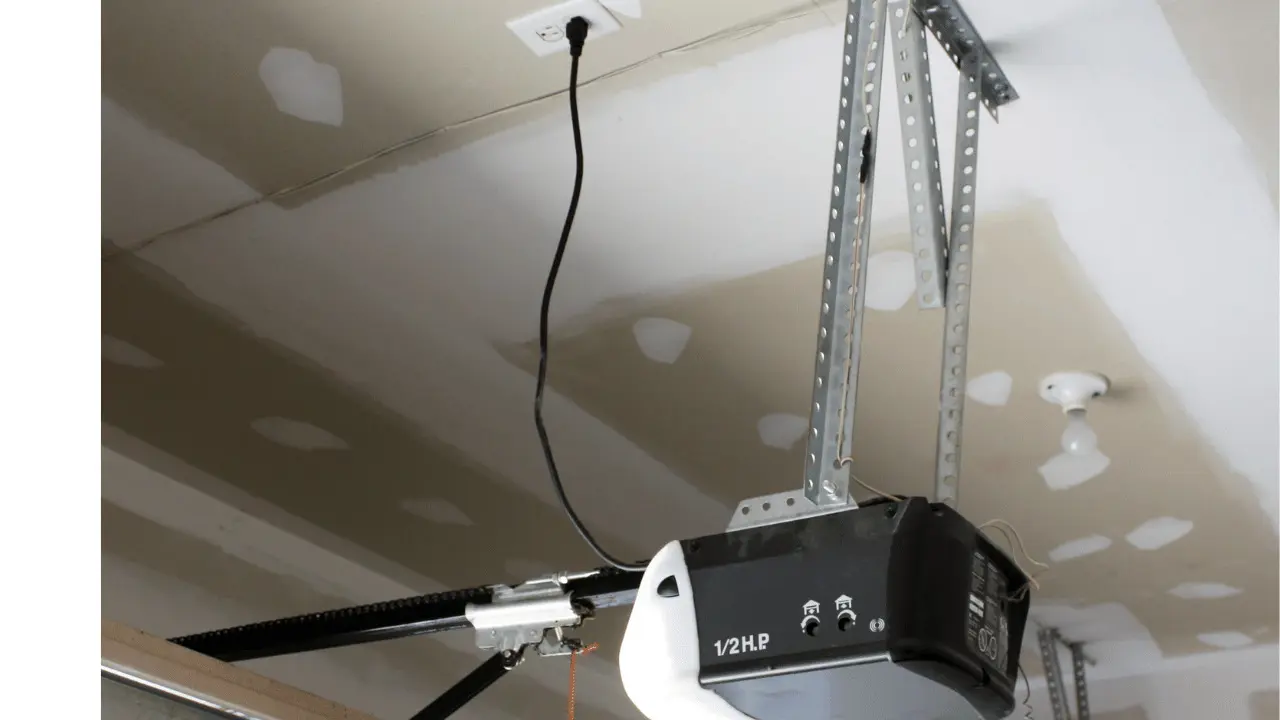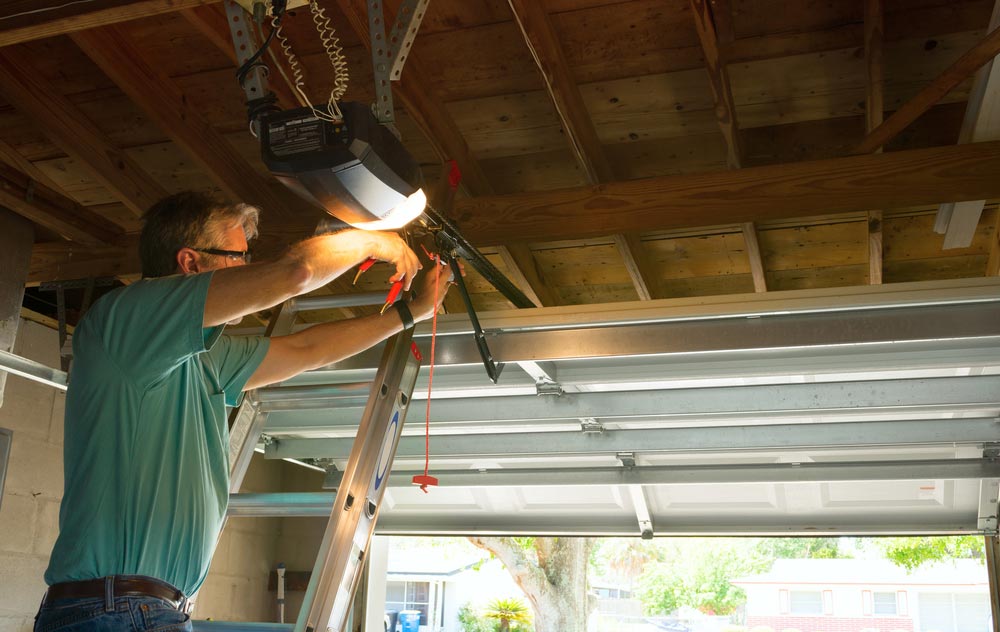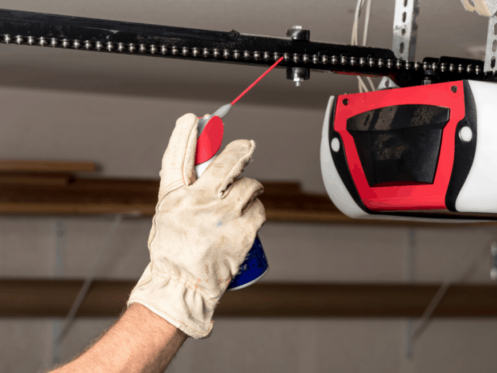A garage door opener plays a key role in your home’s security and convenience, but like all mechanical devices, it eventually wears out.
Understanding its lifespan and how to maintain it can help you save money and ensure smooth operation.
This guide covers the average lifespan of a garage door opener and tips for prolonging its life.
How long does a garage door opener last?
A garage door opener usually lasts 10-15 years with proper care. Regular maintenance, like lubricating parts, can extend its lifespan, ensuring reliable operation for years to come.
Key Takeaways
- The average lifespan of a garage door opener is 10-15 years, depending on usage and maintenance.
- Regular maintenance, such as lubricating parts and checking for wear, can extend the lifespan of your opener.
- Environmental factors, the type of opener, and how frequently the door is used can all impact how long your opener lasts.
Average Lifespan of a Garage Door Opener

On average, a well-maintained garage door opener lasts between 10 and 15 years.
The lifespan can vary depending on several factors, including the brand, model, and how often the opener is used.
Some higher-end models can last longer, while cheaper models or those that are used more frequently may wear out faster.
1. Residential Openers
For most residential garages, the average lifespan is between 10 and 15 years.
If your garage door opener is regularly serviced and used within normal limits, it could last up to 15 years or more.
2. Commercial Openers
Commercial garage doors tend to be used much more often, so their openers typically last between 5 and 10 years.
Factors That Affect the Lifespan of a Garage Door Opener
Several factors influence how long a garage door opener lasts. Understanding these factors can help you make informed decisions about when to replace your garage door opener. If you’re noticing signs of wear or inconsistent performance, consulting a Pingree Grove IL garage door service can provide expert insight and reliable solutions tailored to your specific needs.
1. Frequency of Use
The more often your garage door is used, the quicker the opener will wear out.
For example, if your garage door is used multiple times a day, it will experience more strain than one that is only used a few times a week.
Regularly opening and closing the door puts pressure on the motor, gears, and other components, leading to eventual wear and tear.
Tip: If your garage door is used frequently, consider investing in a heavy-duty opener designed for more frequent use, which can handle the increased workload.
2. Type of Garage Door Opener
There are three main types of garage door openers: chain drive, belt drive, and screw drive. Each type has a different lifespan based on its design and mechanism.
Chain Drive: This is the most common type of garage door opener. While it’s reliable and cost-effective, it can be noisier and may wear out faster if not properly maintained.
Belt Drive: These openers are quieter and tend to last longer than chain drives, making them ideal for homes with attached garages.
Screw Drive: Screw drive openers are known for their durability and can last longer than both chain and belt drives. However, they are typically more expensive.
3. Environmental Factors
Environmental conditions such as humidity, temperature fluctuations, and exposure to dirt and debris can impact the performance and longevity of a garage door opener.
For example, if you live in an area with extreme temperatures, the motor and other components may degrade faster.
Tip: If you live in an area with extreme weather, consider choosing a garage door opener designed to withstand harsher conditions.
4. Maintenance and Care
Regular maintenance plays a significant role in extending the lifespan of your garage door opener.
Simple tasks such as lubricating moving parts, cleaning the tracks, and tightening loose bolts can prevent unnecessary wear and tear.
Neglecting maintenance can lead to problems that shorten the opener’s lifespan.
Tip: Schedule regular garage door maintenance, ideally once a year, to ensure your opener is running efficiently and to identify potential issues early.
Signs That Your Garage Door Opener Needs Replacement

While the average lifespan of a garage door opener is between 10 and 15 years, there are signs that may indicate it’s time to replace your garage door opener sooner. Here are a few signs to look out for:
1. Unusual Noises
If your garage door opener starts making strange or loud noises, it may be a sign of internal wear or mechanical failure.
This could be due to a worn-out motor or damaged parts inside the opener.
2. Slow or Inconsistent Operation
If your garage door is opening or closing slowly, or if it’s not operating smoothly, it could indicate that the opener is struggling to function properly.
This may be a sign that the motor is nearing the end of its life.
3. Frequent Breakdowns
If your garage door opener is breaking down often or requiring frequent repairs, it may be more cost-effective to replace it rather than continually fixing it.
4. Inability to Open or Close the Door
If the garage door opener completely fails to open or close the door, it’s a clear sign that the opener may need to be replaced.
This could be due to a damaged motor, broken gears, or electrical issues.
Frequently Asked Questions
1. How can I tell if my garage door opener is nearing the end of its life?
Signs that your garage door opener is nearing the end of its life include unusual noises, slow operation, frequent breakdowns, and difficulty opening or closing the door.
2. Can I install a new garage door opener myself?
While it’s possible to install a garage door opener yourself, it’s recommended to hire a professional for proper installation, especially if the opener is heavy-duty or complex.
3. How long should a garage door opener last?
With proper maintenance, a garage door opener can last between 10 and 15 years. The lifespan can vary depending on the type of opener and how often it’s used.
Conclusion
The lifespan of a garage door opener depends on several factors, including the type of opener, frequency of use, and regular maintenance.
By understanding the signs of wear and taking proactive measures, you can extend the life of your opener and ensure it operates smoothly.
If your opener is nearing the end of its life or requires frequent repairs, it may be time to replace it.
Always choose a high-quality opener and invest in regular maintenance to get the most out of your garage door system.

